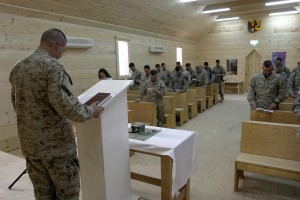 Washington, D.C. — Barack Obama signed into law the 2013 version of the National Defense Authorization Act (NDAA) this week, calling the included Conscience Clause provision that exempts military chaplains from performing homosexual ceremonies “unnecessary and ill-advised.”
Washington, D.C. — Barack Obama signed into law the 2013 version of the National Defense Authorization Act (NDAA) this week, calling the included Conscience Clause provision that exempts military chaplains from performing homosexual ceremonies “unnecessary and ill-advised.”
“Section 533 is an unnecessary and ill-advised provision, as the military already appropriately protects the freedom of conscience of chaplains and service members,” Obama wrote in a statement issued after the signing. “My administration remains fully committed to continuing the successful implementation of the repeal of Don’t Ask, Don’t Tell, and to protecting the rights of gay and lesbian service members; Section 533 will not alter that.”
The section, called “Protection of Rights of Conscience,” had been introduced in Congress last year by then Missouri Representative Todd Akin, and successfully passed both the House and Senate. It provides, “No member of the Armed Forces may require a chaplain to perform any rite, ritual, or ceremony that is contrary to the conscience, moral principles, or religious beliefs of the chaplain, or discriminate or take any adverse personnel action against a chaplain.”
As previously reported, the Obama administration expressed opposition to the provision and others upon its passage, stating that it was “potentially harmful to good order and discipline” in the military. Barack Obama used identical wording to that which was used by the Department of Management and Budget at that time.
“The Administration strongly objects … because those provisions adopt unnecessary and ill-advised policies that would inhibit the ability of same-sex couples to marry or enter a recognized relationship under State law,” the department wrote.
It stated that the conscience clause was “overbroad,” and that it “would prohibit all personnel-related actions based on certain religious and moral beliefs.” Its general objection to the various proposed amendments in stating that they “inhibit the ability of same-sex couples to marry” also suggested that the Department believed that the protections granted to chaplains left no one to officiate the ceremonies.
In announcing his intention to sign NDAA into law, Obama said that additional laws were not needed in regard to the matter because chaplains are already exempt.
“The military already appropriately protects the freedom of conscience of chaplains and service members,” he wrote on January 2nd as he vacationed in Hawaii. “The secretary of defense will ensure that the implementing regulations do not permit or condone discriminatory actions that compromise good order and discipline or otherwise violate military codes of conduct.”
Ron Crews of the Chaplain Alliance for Religious Liberty told reporters that he feels it is important to ensure that the beliefs of Christians are protected in America.
“Every member of our armed forces should be able to serve without surrendering their beliefs,” he said. “The purpose of these provisions is simply to protect the religious liberties of military chaplains who hold to Biblical views concerning sexuality.”
“Chaplains should be able to stand by their faith traditions and honor their commitment to God’s Word,” he said. “That’s a freedom that Congress sought to protect, and the president is not at liberty to disregard the law.”
Recently, two lesbians had to look elsewhere for a chaplain to perform their same-sex ceremony at West Point Military Academy in New York as they were informed that none of the chaplains at the academy come from denominations that support same-sex relationships. Therefore, the two women asked a friend to travel to the state to officiate the ceremony.
Obama stated that there were other provisions in the 680-page bill that he did not like, but felt that “the need to renew critical defense authorities and funding was too great to ignore.”
Become a Christian News Network Supporter...


